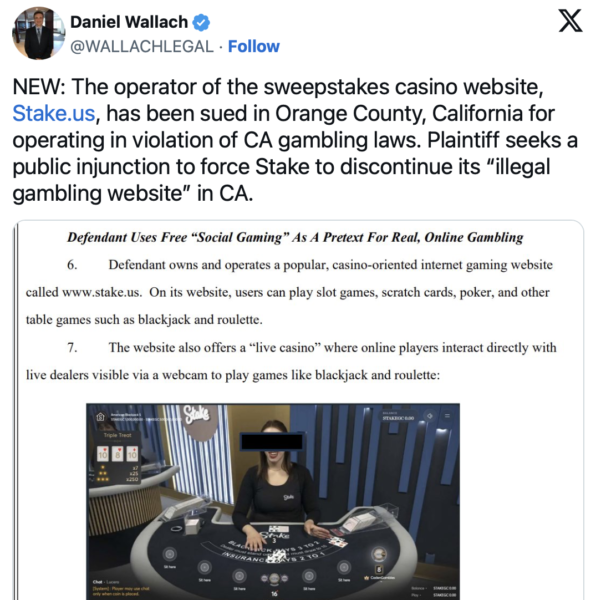Stake.us Sued in California Over Sweepstakes Casino Claims
Stake.us, a sweepstakes casino, faces a fresh lawsuit in California’s Orange County, filed March 25, 2025. The federal court case accuses the platform of running an illegal gambling operation in a state that bans casino-style gaming.

Lawsuit Targets Illegal Gambling Allegations
Plaintiff Dennis Boyle’s complaint says Stake sidesteps California law by masking real-money games as a sweepstakes model, a tactic likened to the shady internet gaming cafes of the early 2000s. It’s pushing to shut down Stake’s site in the state and void user contracts.
The suit piles on charges. It flags Stake’s dual-currency setup Gold Coins for play and Stake Cash for prizes, as a thinly veiled cash grab, arguing it’s gambling, not a freebie. The “play-through requirement” for promo funds gets heat too, called unfair and tilted toward the house.
Other gripes include unlicensed operations, dodgy offshore roots in Gibraltar and Cyprus, and sketchy algorithms that might juice player spending. Boyle claims Stake targets Californians hard, demanding state residency disclosure, yet skips taxes and licensing fees, costing the state big, per the filing.
Stake’s not alone in the crosshairs. California’s cracking down on sweepstakes gaming, and this suit’s part of a wave hitting platforms like Stake.us nationwide.
California’s Hard Line on Sweepstakes
The Golden State’s not playing around. Courts here have long ruled that when cash spent ties straight to sweepstakes entries for casino games, it’s gambling, consideration, and all, per gaming expert Daniel Wallach. That precedent fuels this case, with Stake’s Gold Coins-to-Stake Cash flow under fire.
Wallach notes California’s laws lean pro-plaintiff, with fast-track procedures that skip delays common elsewhere. The lawsuit leans on that edge, aiming to halt Stake’s “illegal gambling site” fast.
It’s bigger than Stake. The suit highlights millions flowing through the platform, untaxed and unregulated, echoing busts of old-school sweepstakes cafes ruled illegal a decade ago. California’s not the only state sniffing around.
Florida, Maryland, Mississippi, and New York are drafting bans, too, with Maryland already slapping a cease-and-desist on one operator.
Recommended

